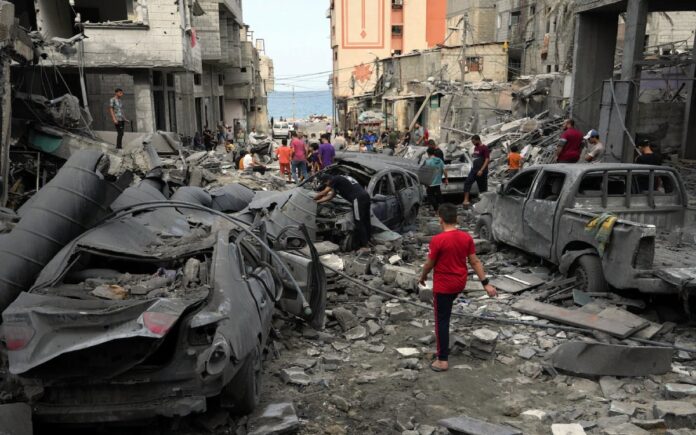Jerusalem: Israeli airstrikes and tank bombardments relentlessly targeted various areas across the Gaza Strip, according to local residents, as White House National Security Adviser Jake Sullivan engaged in discussions with Israeli Prime Minister Benjamin Netanyahu on Sunday. This meeting occurred amidst growing calls from the US for a more targeted approach in Israel’s military operations.
Sullivan’s primary agenda was to urge Israel to focus its efforts on targeting Hamas militants specifically, rather than executing a full-scale assault on the southern Gaza city of Rafah, as outlined by the White House prior to the talks.
Israel’s military campaign has been advancing into Rafah, which it identifies as the last stronghold of Hamas forces. Consequently, hundreds of thousands of Palestinians have been forced to flee the area, seeking refuge elsewhere.
“Across the Gaza Strip, there is no safety,” remarked Majid Omran to Reuters, detailing his family’s ordeal of fleeing Rafah and returning to their heavily damaged home in the southern city of Khan Younis. “We took our children, grandchildren, and daughters and we came and lived above the rubble of our home. Because there is no place to take refuge here,” Omran lamented, amidst the ruins of his property.
Furthermore, Israeli forces have extended their presence into the narrow alleys of Jabalia in northern Gaza, revisiting areas previously cleared in the conflict, as reported by residents.
The Israeli military has justified its operations in Jabalia, Gaza’s largest historic refugee camp, as precise measures aimed at preventing Hamas from reestablishing control in the area.
Prior to the discussions on Sunday, an Israeli official indicated that Prime Minister Benjamin Netanyahu and his senior aides would advocate for continuing the push into Rafah during talks with Sullivan. The official highlighted the success of evacuating approximately half of the city’s Palestinian population in just 12 days, possibly assuaging past US concerns about the feasibility of Israel’s humanitarian efforts.
Israel also voiced apprehensions about the discovery of numerous tunnels under Rafah, allegedly used by Hamas for weapon smuggling and potentially for other illicit activities.
Also Read | Amid Escalating Tensions, Iran and US Explore Diplomatic Channels in Oman
Meanwhile, Washington expressed concerns for the displaced Palestinians in Rafah, emphasizing the importance of not only evacuating them but also ensuring suitable alternative accommodation.
Amidst these diplomatic efforts, the violence continues to escalate, with at least 28 Palestinians reported killed on Sunday alone, according to Gaza health officials and Hamas. The toll includes casualties from a strike on a house in Nuseirat, central Gaza.
Since the October 7 Hamas assault that triggered the conflict, casualties have been mounting on both sides, with Israeli tallies reporting 1,200 deaths. Palestinian health officials report that at least 35,386 Palestinians have been killed in Israeli strikes since October 7, exacerbating concerns of widespread hunger and shortages of essential supplies.
Also Read | American Forces to Exit Niger by September 15
In response to the escalating crisis, the US military has initiated aid deliveries to Gaza via a temporary pier, aiming to alleviate the humanitarian crisis in the besieged enclave.
However, armed groups in Gaza, including the Popular Resistance Committee (PRC), have issued warnings against the presence of foreign military forces in the territory, threatening retaliation against Israeli and US troops.
Despite these challenges, diplomatic efforts persist as stakeholders seek a resolution to the ongoing conflict.



